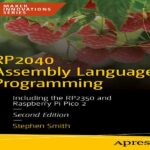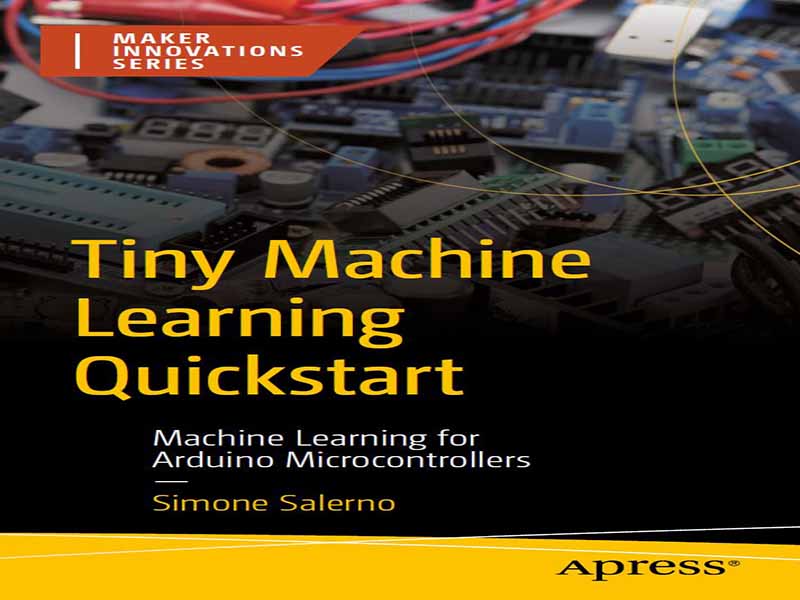- عنوان کتاب: Tiny Machine Learning QuickStart – Machine Learning for Arduino Microcontrollers
- نویسنده: Simone Salerno
- حوزه: یادگیری ماشین, Arduino
- سال انتشار: 2025
- تعداد صفحه: 340
- زبان اصلی: انگلیسی
- نوع فایل: pdf
- حجم فایل: 11.9 مگابایت
در چشمانداز همواره در حال تکامل فناوری، خود را در نقطه تلاقی جذابی مییابیم که در آن دنیای یادگیری ماشین و سیستمهای تعبیهشده به هم میرسند. این همگرایی باعث تولد Tiny Machine Learning (که اغلب به صورت TinyML®، علامت تجاری بنیاد EdgeAI، خلاصه میشود) شده است – حوزهای که قدرت هوش مصنوعی را به کوچکترین و محدودترین دستگاههای محاسباتی میآورد. Tiny ML به جای نیاز به زیرساخت ابری گرانقیمت یا رایانههای قدرتمند، به الگوریتمهای پیچیده اجازه میدهد تا مستقیماً روی میکروکنترلرها اجرا شوند و نسل جدیدی از دستگاههای هوشمند را قادر میسازد که میتوانند به صورت محلی، با حداقل مصرف برق و بدون اتصال به اینترنت تصمیمگیری کنند.
برای علاقهمندان به آردوینو، TinyML هم یک فرصت هیجانانگیز و هم یک چالش مهم را نشان میدهد. پلتفرم آردوینو مدتهاست که به دلیل دسترسیپذیریاش محبوب بوده و به افراد با حداقل تجربه برنامهنویسی اجازه میدهد تا به سرعت پروژههای الکترونیکی تعاملی ایجاد کنند. اکنون، با TinyML، این پلتفرم قابل دسترس، توانایی پیادهسازی قابلیتهای پیشرفته یادگیری ماشین را که قبلاً غیرقابل دسترس بودند، به دست میآورد.
با این حال، سفر به TinyML میتواند دلهرهآور باشد، به خصوص برای کسانی که ممکن است پیشینهای در علوم داده یا یادگیری ماشین نداشته باشند. بسیاری از آموزشها و منابع، دانش قبلی از اصول یادگیری ماشین را فرض میکنند یا نیاز به درک ریاضی گستردهای دارند که مانع قابل توجهی برای ورود ایجاد میکند. علاوه بر این، محدودیتهای محیطهای میکروکنترلر، لایه دیگری از پیچیدگی را اضافه میکنند. برخلاف سیستمهای یادگیری ماشین مبتنی بر ابر با منابع تقریباً نامحدود، توسعه TinyML نیاز به بهینهسازی دقیق دارد تا در محدودیتهای شدید حافظه، قدرت پردازش محدود و بودجههای انرژی سختگیرانه قرار گیرد. تبدیل و بهینهسازی مدلهای یادگیری ماشین برای این محیطها نیازمند دانش تخصصی است که شکاف بین یادگیری ماشین سنتی و برنامهنویسی سیستمهای تعبیهشده را پر میکند.
دقیقاً به همین دلیل است که این کتاب وجود دارد. شروع سریع یادگیری ماشین Tiny رویکردی اساساً متفاوت برای آموزش TinyML اتخاذ میکند. به جای اینکه بیش از حد به مبانی نظری و ریاضی علم داده بپردازیم، با راهحلهای کاربردی و کدهای عملی شروع میکنیم که میتوانید بلافاصله از همان فصلهای اول آنها را پیادهسازی کنید. در حالی که درک اصول اساسی یادگیری ماشین بدون شک ارزشمند است، بسیاری از علاقهمندان به آردوینو صرفاً میخواهند ویژگیهای هوشمند را به پروژههای خود اضافه کنند بدون اینکه به متخصصان یادگیری ماشین تبدیل شوند. این کتاب با ارائه قطعه کدهای آماده برای استفاده، گردشهای کاری کامل و تکنیکهای عملی که ابتدا نتایج را ارائه میدهند، به این خواسته احترام میگذارد و تئوری را فقط در صورت لزوم برای پشتیبانی از درک عملی معرفی میکند.
In the ever-evolving landscape of technology, we find ourselves at a fascinating intersection where the worlds of machine learning and embedded systems converge. This convergence has given birth to Tiny Machine Learning (often shortened as TinyML®, trademark of the EdgeAI foundation)—a field that brings the power of artificial intelligence to the smallest and most resource-constrained computing devices. Rather than requiring expensive cloud infrastructure or powerful computers, Tiny ML allows sophisticated algorithms to run directly on microcontrollers, enabling a new generation of intelligent devices that can make decisions locally, with minimal power consumption and without Internet connectivity.
For Arduino enthusiasts, TinyML represents both an exciting opportunity and a significant challenge. The Arduino platform has long been beloved for its accessibility, allowing individuals with minimal programming experience to create interactive electronic projects quickly. Now, with TinyML, this accessible platform gains the ability to implement sophisticated machine learning capabilities that were previously beyond reach.
However, the journey into TinyML can be daunting, especially for those who may not have a background in data science or machine learning. Many tutorials and resources assume prior knowledge of machine learning principles or require extensive mathematical understanding, creating a significant barrier to entry. Furthermore, the constraints of microcontroller environments add another layer of complexity. Unlike cloud-based machine learning systems with virtually unlimited resources, TinyML development requires careful optimization to fit within tight memory constraints, limited processing power, and strict energy budgets. Converting and optimizing machine learning models for these environments demands specialized knowledge that bridges the gap between traditional machine learning and embedded systems programming.
This is precisely why this book exists. Tiny Machine Learning Quickstart takes a fundamentally different approach to teaching TinyML. Rather than digging too much into the theoretical and mathematical foundations of data science, we start with working solutions and practical code that you can implement immediately from the very first chapters. While understanding the underlying principles of machine learning is undoubtedly valuable, many Arduino enthusiasts simply want to add intelligent features to their projects without becoming machine learning experts. This book respects that desire by providing ready-to-use code snippets, complete workflows, and practical techniques that deliver results first, with theory introduced only where necessary to support practical understanding.
این کتاب را میتوانید از لینک زیر بصورت رایگان دانلود کنید:
Download: Tiny Machine Learning QuickStart



































نظرات کاربران